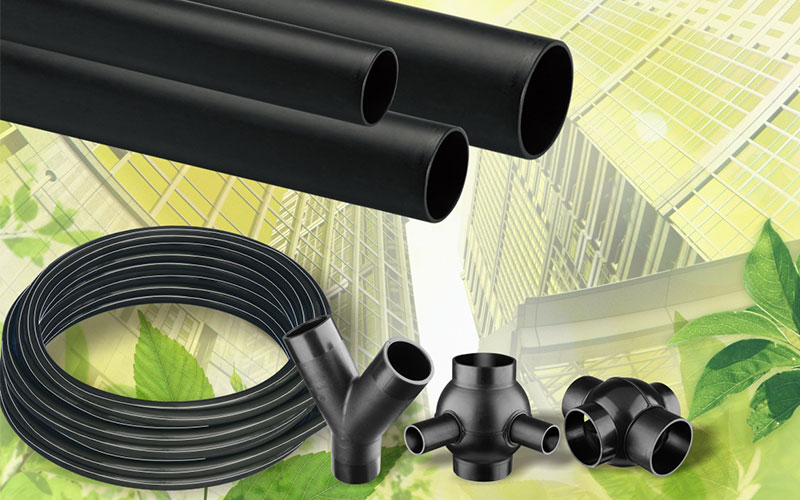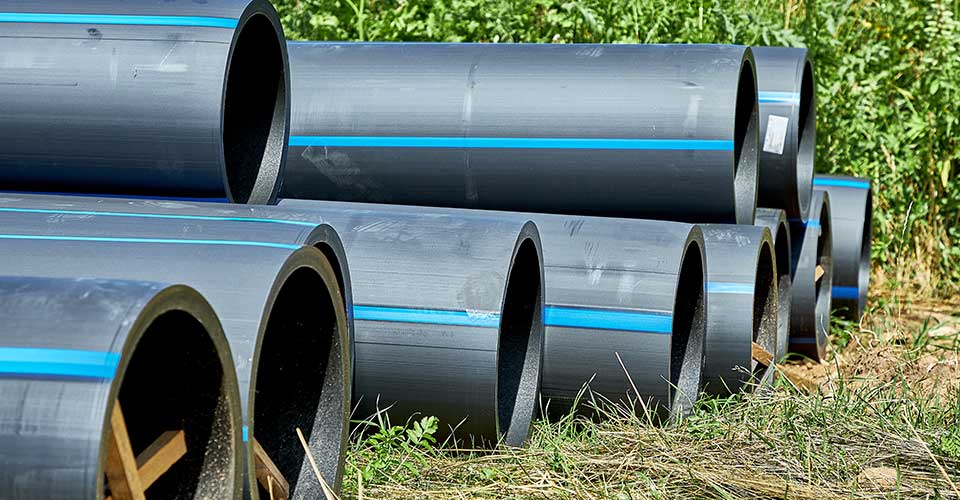How American Plastics HDPE Pipe for Oilfield Supports Energy Infrastructure
Wiki Article
Comprehending the Secret Conveniences of HDPE Pipe for Water and Wastewater Monitoring
Using HDPE pipeline in water and wastewater administration provides various advantages that merit consideration. Its exceptional sturdiness and long life expectancy make it a preferred option for many jobs. In addition, the material's resistance to corrosion and chemical damage boosts its reliability in numerous atmospheres. However, the benefits extend beyond just durability and resistance. Exploring its cost-effectiveness and environmental effect reveals also a lot more compelling reasons for its extensive adoption in modern frameworkExtraordinary Durability and Durability

HDPE pipe sticks out for its outstanding durability and long life, making it a favored option in water management systems. Constructed from high-density polyethylene, these pipes can stand up to considerable stress and anxiety, making certain reputable performance over time. Their robust nature allows them to sustain severe environmental problems, consisting of temperature level variations and dirt motions, which can cause various other materials to fail.
The life expectancy of HDPE pipelines commonly exceeds 50 years, supplying a cost-effective option for towns and markets alike. Furthermore, the material's lightweight buildings streamline installation, lowering labor prices and timeframes. This resilience lessens the requirement for constant fixings or substitutes, better improving its financial charm.
In water administration applications, the reliability of HDPE pipes means fewer disruptions and improved service connection, making them important to sustainable facilities development. The combination of resilience and long life strengthens HDPE's duty as a cornerstone in reliable water administration services.

Resistance to Rust and Chemical Damage
While numerous products succumb to deterioration and chemical damage gradually, HDPE pipes show exceptional resistance, making them excellent for various water management applications. This durability originates from the molecular structure of high-density polyethylene, which is inherently non-reactive and does not rust like steels or weaken from exposure to rough chemicals. Therefore, HDPE is highly reliable in settings with aggressive substances, such as wastewater systems that may include acids, bases, and organic solvents.
In addition, HDPE pipelines can withstand ecological factors such as dirt level of acidity and saline conditions, additionally improving their viability for varied applications (Pipe Supplier American Plastics Midland). Their capability to maintain architectural integrity over time lowers the danger of leakages and failings, which is vital in ensuring the security and dependability of water circulation and wastewater monitoring systems. The resistance to corrosion and chemical damages noticeably adds to the overall effectiveness and durability of HDPE piping options.
Cost-Effectiveness and Economic Benefits
When taking into consideration the financial implications of water administration systems, the cost-effectiveness of HDPE pipelines ends up being evident. These pipes offer reduced installment and maintenance prices compared to typical materials like steel or concrete. Their light-weight nature simplifies transportation and installation, resulting in minimized labor costs. Furthermore, HDPE pipes display a lengthy life expectancy, often going beyond half a century, which converts to less substitutes and lasting financial savings.The resistance of HDPE to deterioration and chemical damages decreases the requirement for expensive repairs and substitutes. The pipelines additionally support efficient look at this web-site water circulation, minimizing energy expenses connected with pumping systems. By mitigating leakages and water loss, HDPE pipelines add to considerable economic benefits for districts and markets alike. Overall, the first investment in HDPE piping can produce significant financial returns over the lifespan of the water administration system, making it a prudent selection for sustainable infrastructure development.
Ecological Sustainability and Reduced Effect

Convenience and Flexibility in Setup
Because of their special residential properties, HDPE pipes provide exceptional adaptability and flexibility in setup, making them appropriate for a variety of applications. Their light-weight nature enables less complicated handling and transportation, lowering labor expenses and installation time. HDPE pipelines can be curved and shaped to fit various terrains and project demands, which is specifically valuable in testing settings.Additionally, their resistance to corrosion and chemical damages permits installment in diverse settings without the need for specialized safety coatings. The ability to fuse joints develops a constant, leak-free system, enhancing the general honesty and dependability of the installment. HDPE's versatility also fits ground motion, reducing the risk of damage in locations vulnerable to shifting soil. In general, these features make HDPE pipes not only functional but likewise a recommended selection for water and wastewater monitoring systems.
Frequently Asked Inquiries
Just How Does HDPE Pipe Compare to PVC in Water Monitoring Applications?
HDPE pipeline offers superior versatility, resistance to corrosion, and sturdiness compared to PVC. Its lighter weight helps with easier setup, while its lengthy life-span drain line plumbing reduces replacement expenses, making HDPE a recommended choice in water management applications.What Is the Life-span of HDPE Piping Under Regular Conditions?
Under typical conditions, HDPE pipes can have a life-span varying from 50 to 100 years. Their longevity and resistance to corrosion add to their long-term efficiency in numerous applications, making them a trusted selection for framework.Are HDPE Water Lines Recyclable After Their Life Span?
Yes, HDPE pipes are recyclable after their service life. American Plastics HDPE Pipe for Oilfield. They can be refined and repurposed into brand-new items, considerably minimizing environmental influence and advertising sustainability within the market, making them an environment-friendly choice for piping solutionsWhat Is the Installment Process for HDPE Pipes?
The installment process for HDPE pipelines entails website preparation, trenching, pipe blend or mechanical signing up with, backfilling, and pressure testing. Appropriate methods ensure a long lasting and reliable system for moving water and wastewater effectively.Can HDPE Pipes Be Utilized for Both Potable and Non-Potable Water Systems?
Yes, HDPE pipes can be utilized for both potable and non-potable water systems. Their versatility, longevity, and resistance to rust make them ideal for various applications, making certain safe and effective transportation of water in different contexts.Report this wiki page